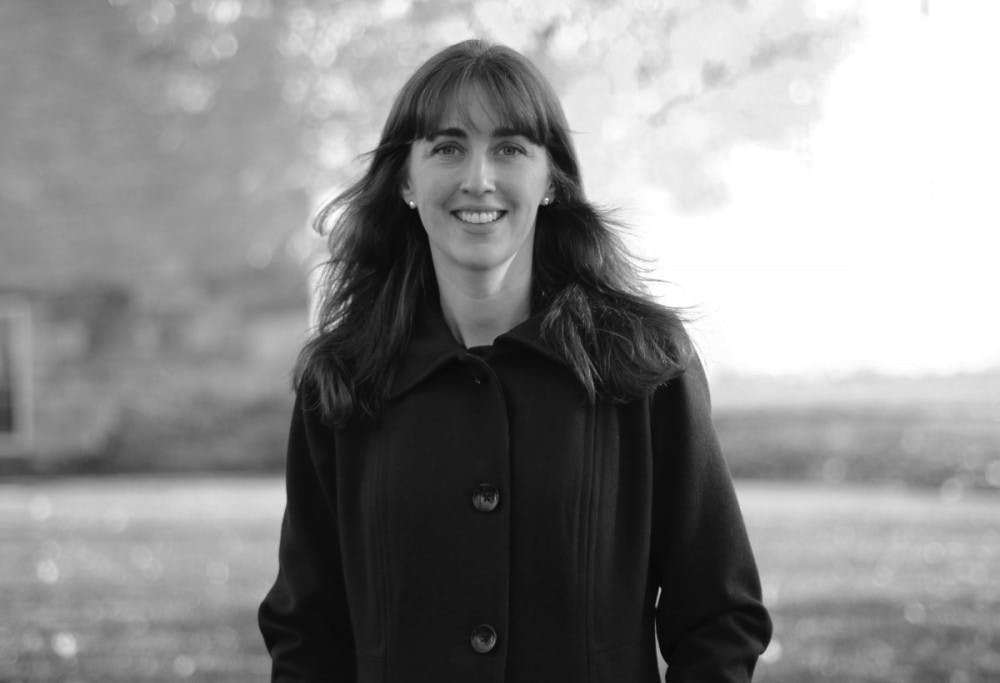The reproductive rights of women have been a source of controversy for decades, eliciting a tug-of-war between opinions on what women should do in the face of unplanned parenthood. Contemporary public discourse often overlooks quantitative analysis of this particular issue.
Caitlin Myers has been a professor of economics at Middlebury since 2005, teaching numerous courses within the department and conducting her own research on topics that capture her interest. The most notable of these research endeavors is her focus on the causal effects of reproductive policies and access to reproductive healthcare on the lives of women. Myers says she “applies an economic lens to this important issue by bridging an intersection between social questions and statistical methods through application of the scientific method to testable questions.”
Myers grew up on the Georgia-Alabama border, in an area that was once a center of textile manufacturing. Surrounded by segregated facilities, she attended a public high school that was predominantly black.
“I was living in the middle of this community as a relatively privileged person racially, which evoked a shock to my system upon entering into college life,” she said. “Attending college at Tulane University changed my perspective of where I came from.”
For her, this change in social context needed to be “made sense of and placed in a broader context.” Economics was a powerful tool to understand issues of inequality, she said. This “tool,” combined with her natural curiosity, sparked her interest in researching the powerful social issues she was surrounded by as a child — including that of the legalization of abortion and its implications.
So what kind of research does Myers do, exactly?
“I use natural experiments where I compare outcomes from naturally occurring treatment and control groups,” she said. Quantitatively studying reproductive rights requires investigating human subjects. With this, there exist certain ethical principles to conduct experiments, such as ensuring participants give informed consent and protecting participants from undue stress and harm.
Additionally, randomly assigning subjects to control or treatment groups is often not possible when studying people. Myers refers to this quantitative technique as “infeasible or unethical” for the kind of research she does. Instead, she uses other statistical methods, like natural experiments, that are more ethical and do not require randomization.
Myers’ research has caught the eye of many well-known journals and newspapers, including the New York Times UpShot. This summer, UpShot covered her investigation about what would happen if Roe v. Wade were to be overturned. In 1973, the Supreme Court ruled that women would have the freedom to choose to have an abortion without government interference. So, if Roe v. Wade were overturned, many abortion clinics would be forced to close. After pinpointing the location of every abortion facility in the U.S., Myers discovered that women in the Southern and Midwestern regions of the United States would have to travel greater distances to reach a provider.
Myers found that 100,000 women would have difficulty reaching an abortion clinic in just a year proceeding an overturning of Roe v. Wade. “This demonstrates a causal effect of regulating abortion on access to reproductive care, which is an insurmountable burden for women in regards to reproductive rights,” Myers said.
When asked why her research is increasingly important in the changing social times, she said, “In a nutshell, my research measures the burdens on women while feeding in to evidence-based policy making.”
Oftentimes, students see the field of economics in a limited way — as simply a path to Wall Street, for example. Myers, however, believes that “answering thorny social questions requires a variety of approaches and economics provides students with a diverse and powerful toolbox to do so.” She, and others in her field, aim to contribute to our understanding of the reproductive rights of women, helping to raise awareness of its importance and applications in our rapidly changing world.
The economics of reproductive rights

Comments



